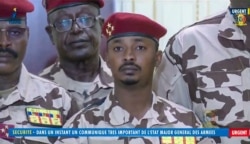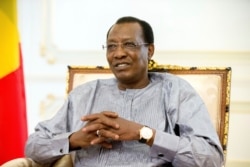Chad’s army says President Idriss Deby has been killed in clashes with rebels, ending his 30-year grip on power in the Central African nation.
Speaking on state television Tuesday, an army spokesman said Deby died of injuries sustained while visiting troops on the front line. A rebel force known as the Front for Change and Concord in Chad has advanced from the north in recent days toward the capital, N’Djamena.
The government and parliament have been dissolved, and the army spokesman, Azem Bermendao Agouna, said a military council will take charge of Chad for the next 18 months. He said the council will be led by Deby’s 37-year-old son, General Mahamat Idriss Deby Itno.
The U.S. State Department offered condolences to the people of Chad and said the U.S. supports a “peaceful transition of power in accordance with the Chadian constitution.”
The commander for the U.S. military’s Africa Command, General Steven Townsend, said Tuesday it’s not clear what Deby’s death will mean for U.S.-Chadian relations but added that Deby’s son is inclined toward good relations both with France, which has a military base in Chad, and the United States.
Earlier, AFRICOM said it is “closely monitoring the rebel incursion in Chad,” while the U.S. Embassy in N’Djamena ordered employees to shelter in place, citing the potential for unrest.
The 68-year-old Deby had ruled Chad since coming to power in a December 1990 coup, making him one of Africa’s longest-serving leaders. Opponents called him an autocrat and criticized his management of Chadian oil revenue. In 2008, a different rebel force reached N’Djamena and came close to toppling Deby before French and Chadian army forces drove them out of the city.
In the West, however, Deby was seen as an important ally in the fight against Islamist extremist groups in West Africa and the Sahel, like Nigeria-based Boko Haram.
Former colonial power France hailed Deby on Tuesday as a “courageous friend” and “great soldier” who tried to protect his country. The statement urged the post-Deby transition take place under “peaceful conditions.”
Chadian opposition leader Saleh Kebzabo told VOA’s French to Africa service that he was surprised to learn of President Deby’s death and called for talks to solve the country’s issues.
“We think that, in this kind of situation, one should refrain from precipitous decisions. One should make time for concertation, time for unity and understanding, so that Chadians can look at the future in the same direction," he told VOA. "It is also the occasion to recall that, last week, political actors, including myself, and those of civil society groups signed a common statement titled ‘Joint Statement for an Inclusive Dialogue.’ So, the time for dialogue is now, the dialogue opportunity is here. Chadians must get together right away for such dialogue.”
On Monday, Deby was declared the winner of Chad's April 11 election with 79 percent of the vote, giving him a sixth term in office. Most opposition groups had boycotted the poll, citing arrests and a government ban on opposition rallies.
His campaign said Monday that Deby was going to the front line to join army troops battling what he called terrorists.
Libya-based rebels, known by their French acronym FACT, had attacked a border post on election day and then moved hundreds of kilometers toward the capital. On Monday, the Chadian army said it had inflicted a heavy loss on the rebels, killing more than 300 of them.
A different rebel force reached N’Djamena in 2008 and came close to toppling Deby before army forces drove them out of the city.
National Security correspondent Jeff Seldin and VOA French to Africa service contributed to this report







